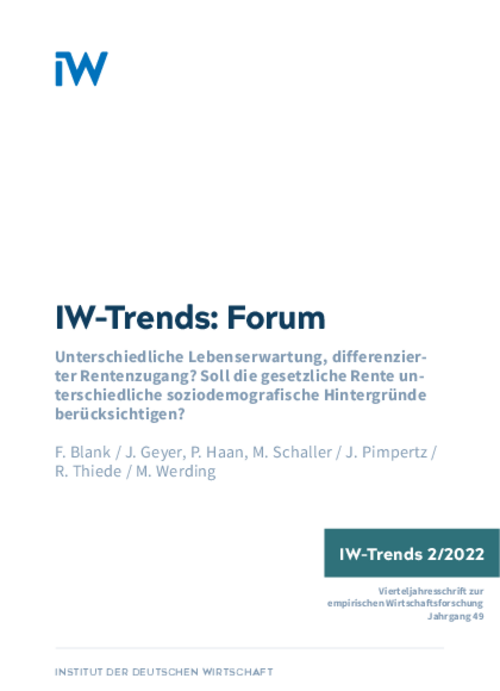While German law stipulates a standard retirement age for all members of the public pension scheme, empirical studies have shown that life expectancy is unevenly distributed within the population, varying according to income level, professional status, occupational health risks, and gender.

A Variable Retirement Age for Varying Life Expectancies?: Should the State Pension Scheme Take Different Socio-demographic Backgrounds into Account?

While German law stipulates a standard retirement age for all members of the public pension scheme, empirical studies have shown that life expectancy is unevenly distributed within the population, varying according to income level, professional status, occupational health risks, and gender.
It can thus be assumed that these same factors influence the length of time retirees draw their pension. In the public debate, this phenomenon, which can lead to regressive distribution effects rendered even stronger by the recent raising of the pensionable age to 67, is often criticised as unjust. Indeed, it could be regarded as justifying demands to base the retirement age or benefit reductions for early retirement on the socio-demographic background of the insured. In our forum, Prof. Peter Haan, Dr. Johannes Geyer and Maximilian Schaller of the German Institute for Economic Research (DIW, Berlin), Prof. Martin Werding of the Ruhr University of Bochum, Dr. Reinhold Thiede of the German Statutory Pension Insurance National Office, Dr. Florian Blank of the Institute of Economic and Social Research (WSI, Düsseldorf) and Dr. Jochen Pimpertz of the German Economic Institute (IW, Cologne) discuss whether variations in life expectancy should be taken into account in pension legislation, how this could be achieved, what the consequences would be, and what alternative solutions could conceivably take account of the different employment biographies and preferences of those entering retirement.

A Variable Retirement Age for Varying Life Expectancies?: Should the State Pension Scheme Take Different Socio-demographic Backgrounds into Account?

More on the topic

The Political Economy of Pension Reform
As the German population ages, the country’s statutory pension scheme, which is financed on a pay-as-you-go basis, requires higher and higher contributions while the level of pensions is falling.
IW
Expenditures and Revenues in Germany’s Statutory Health Insurance
Almost annually recurring deficits in Germany’s statutory health insurance system have led to a steady rise in the contribution rate, a percentage of earned income.
IW